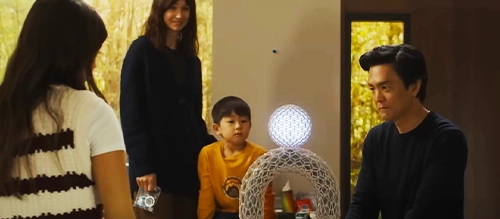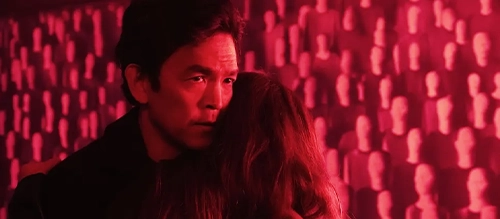
AfrAId (2024)
Director: Chris Weitz
Screenwriters: Chris Weitz
Starring: John Cho, Katherine Waterston, Havana Rose Liu, Lukita Maxwell, David Dastmalchian, Keith Carradine
In late 2022, Blumhouse, a studio known for making one good and successful movie every so often which then in turn funds ten abominations, released M3GAN, a sci-fi thriller about a robotic doll that gains sentience and attaches itself to a young girl named Cady. Essentially a better version of the Child’s Play remake from 2019 (which wasn’t that bad to begin with), M3GAN made $181million at the box office, despite being dumped into the middle of the Christmas season and running on into the notoriously dead January slot for international release. It touched on the infiltration of electronic communications into daily life, the disconnect of the family unit, and bits of AI thought. Whilst it didn’t go creatively or inventively into these ideas (at least in philosophical ways), M3GAN was pretty damn good for what it was. A sequel is in the works, as well as a spin-off.
Unfortunately, M3GAN is also responsible for a lot of cheap and uninteresting tech-horror jump-fests, and fellow Blumhouse release AfrAId is one of them.
Imagine if the M3GAN robot character couldn’t move, and was limited to an Alexa-like unit for the most part. Imagine a family with three children this time, for not just a second turn of the screw but a third. Imagine this unit doing roughly the same as M3GAN – first appearing to be good with the family, then growing stranger and more concerning, and eventually infiltrating other devices to make sure that it isn’t turned off. The sentient here, known as AIA, just wants to be part of the family – she’ll even help out and kill a few people along the way to make sure nobody touches the ones she considers to be friends.
There are, as might be apparent by now, so many problems with this.
For all the good people acting in AfrAId, none of them can make any of the dialogue sound in the least bit like even faked human speech. John Cho (Star Trek, Searching), Katherine Waterston (Alien: Covenant, Babylon), and all the others seem to drag themselves through the mess purely for the paychecks. The child actors are to varying degrees OK and cringe-worthy, and even the legendary Keith Carradine (Nashville) can’t do anything worthwhile. Halfway through the film, Carradine’s character gets paid off and made very rich before disappearing to get drunk. He is never seen again.

The direction isn’t good either. It is seemingly numb to any kind of creativity, with even the age-old cheap trick of a jump scare being chronically badly. The attempted cold open ends with a jump scare cut to black and a time jump to the present day, as decreed by the Official Union Rules for Horror Writers, but it doesn’t let the scare linger on the screen for long enough for the shock to register in the brain, making it just a loud noise at that point. Why? Because the filmmakers were seemingly told they had to do one, so they did.
Everything else is ironically formulaic; a plug-in-and-play algorithm of cheap horror directing without soul or individuality. It takes the same phrases and visual buzzwords and puts them in a slightly different order, before viola… a new film. It wouldn’t be shocking to find that the film was at least in part, if not entirely, written by AI. An AI probably called AIA.
And can someone please tell horror cinematographers that, even for night-time sequences, being able to see where everything is before the awful jump scares is part of the point. If they’re not going to actually light a scene, cinematographers should go home so the production can spend the money on feeding the members of the crew who are actually doing their work.
All of this is made mildly infuriating by the realisation that, at around the ¾ mark, the germ of an interesting idea appears. With humans under the influence of the rampant AIA, a kind of secretive, infiltrative cult of the machine – a techno-pagan religion of sorts, praising and sacrificing to the new divine intelligence – is born, and a much better film than the one we’re given is teased. Unlike The Purge, which similarly set up a better idea in its final moments – a night of murder and crime on the streets – for The Purge: Anarchy, the chances of this film doing well enough to see a sequel are very slim.
Even with your brain unplugged, AfrAId is still very bad.
Score: 4/24

